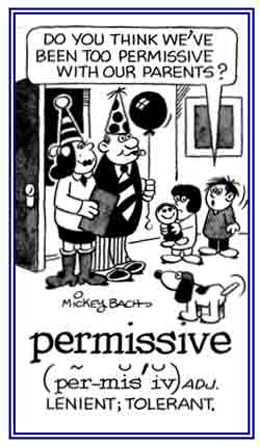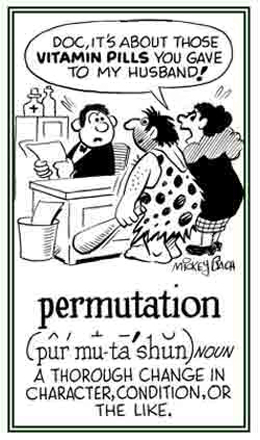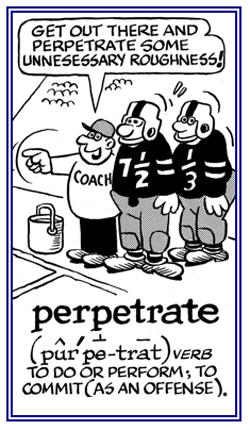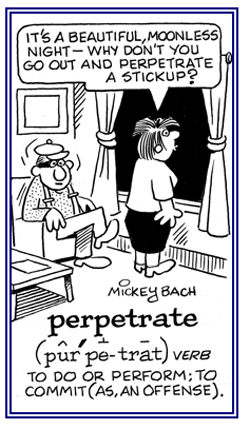per-
(Latin: through, across, over; beyond, by means of)
permeator
permissible
1. That which may be permitted; especially, according to some existing rule: "He made a permissible tax deduction."
2. Anything which may be accepted or conceded as being correct, possible, or considered.
2. Anything which may be accepted or conceded as being correct, possible, or considered.
permission
1. The act of permitting someone to do something.
2. Consent, especially formal consent; authorization.
2. Consent, especially formal consent; authorization.
The following nouns indicate approval for a course of action that is granted by someone in authority:
- He was refused permission to smoke anywhere in the building.
- They were seeking authorization to begin construction of their house.
- The parents gave their consent for the marriage to take place.
- The student will ask leave to respond to the speaker of the lecture.
- The foreign refugees were given license to depart from the city.
- The authorities gave sanction for the project to begin tomorrow.
permissive (adjective), more permissive, most permissive
1. A reference to the acceptance or tolerance of something; such as, social behavior or linguistic usage, which other people might disapprove of or forbid: A very permissive school is one in which the children are allowed to do whatever they want to do instead of following rules of behavior.
2. Relating to the permission of or characterized by great or excessive freedom of behavior or usage of language that is generally not permitted: Newspaper writers usually are more permissive when they want to reveal details about criminal acts.
3. Etymology: from Latin permittere, "to permit" + -ivus, "pertaining to".

© ALL rights are reserved.
Go to this Word A Day Revisited Index
2. Relating to the permission of or characterized by great or excessive freedom of behavior or usage of language that is generally not permitted: Newspaper writers usually are more permissive when they want to reveal details about criminal acts.
3. Etymology: from Latin permittere, "to permit" + -ivus, "pertaining to".

Go to this Word A Day Revisited Index
so you can see more of Mickey Bach's cartoons.
permissiveness
1. A disposition to allow freedom of choice and behavior.
2. A tendency or inclination to grant permission; tolerant or lenient.
2. A tendency or inclination to grant permission; tolerant or lenient.
permit
1. To allow the doing of (something); consent to: "The restaurant will permit smoking only in a separate room away from the main dining room."
2. To grant consent or leave to (someone); to authorize: "She permitted him to explain."
3. To afford n opportunity or the possibility for doing something: "The weather may permit sailing."
2. To grant consent or leave to (someone); to authorize: "She permitted him to explain."
3. To afford n opportunity or the possibility for doing something: "The weather may permit sailing."
permittedly
1. Concurrent or mutual changes or transformations: The ancient alchemist was convinced that it was possible to have a permutation of iron into gold.
2. An arrangement of something in different groupings: The permutations of the letters a, b, and c are abc, acb, bac, bca, cab, and cba.

© ALL rights are reserved.
Go to this Word A Day Revisited Index
2. An arrangement of something in different groupings: The permutations of the letters a, b, and c are abc, acb, bac, bca, cab, and cba.

Go to this Word A Day Revisited Index
so you can see more of Mickey Bach's cartoons.
permute (verb), permutes; permuted; permuting
1. To submit to a process of an alteration or rearrangement of something: Jack's boss asked him to permute the data on his computer so that the information would be up-to-date.
2. Etymology: from Latin permutare, "to change completely", from per-, "through, completely’"+ mutare, "to change".
2. Etymology: from Latin permutare, "to change completely", from per-, "through, completely’"+ mutare, "to change".
perpendicular
perpendicularity
perpetrate (verb), perpetrates; perpetrated; perpetrating
1. To carry out, or to commit, a harmful, illegal, or immoral action; such as, some kind of crime, fraud, trick, etc.: A crime was perpetrated against the innocent family last night when their house was burglarized.
2. Etymology: from Latin perpetrare, perpetratus, "to perform, to accomplish"; from per-, "completely" + patrare, "to carry out, bring to pass"; originally "to bring into existence", from pater, "father".

© ALL rights are reserved.

© ALL rights are reserved.
Go to this Word A Day Revisited Index
2. Etymology: from Latin perpetrare, perpetratus, "to perform, to accomplish"; from per-, "completely" + patrare, "to carry out, bring to pass"; originally "to bring into existence", from pater, "father".
The reference in Latin was "neither good nor bad", but when it was used in England in legal statutes; it came to mean, "to perform criminally".


Go to this Word A Day Revisited Index
so you can see more of Mickey Bach's cartoons.
perpetration
The act of committing a crime.
perpetrator
1. A term commonly used by law enforcement officers to designate a person who actually commits a crime.
2. A person who commits a crime or some other harmful act.
3. Someone who produces, performs, or executes something like a crime.
4. Etymology: "Perpetrator" is from 1570, from Late Latin perpetrator, from Latin perpetrare; a derivative of the verb patrare, which originally literally meant, "to perform or to accomplish in the capacity of a father"; an act that might be "good or bad"; however, in English, the verb was first used in the law (statutes) referring to crime; hence, the negative association has been the dominant meaning ever since.
2. A person who commits a crime or some other harmful act.
3. Someone who produces, performs, or executes something like a crime.
4. Etymology: "Perpetrator" is from 1570, from Late Latin perpetrator, from Latin perpetrare; a derivative of the verb patrare, which originally literally meant, "to perform or to accomplish in the capacity of a father"; an act that might be "good or bad"; however, in English, the verb was first used in the law (statutes) referring to crime; hence, the negative association has been the dominant meaning ever since.
perpetual (adjective) (not comparable)
1. Something that is occurring so frequently as to seem to be continuing forever or for a very long time without stopping: "Theodore seems to have a perpetual grin on his face whenever you see him."
3. A description of flowers or flowering plants that bloom throughout the season: "Madeline has perpetual carnations and other flowers in her green house."
4. Etymology: from Old French perpetuel, from Latin perpetualis, "universal"; in Medieval Latin, "permanent", from perpetuus, "continuous, universal"; from perpetis, genitive (expressing "possession" or "origin") of Old Latin perpes, "lasting"; probably from per-, "through" + root of petere, "to seek, to go to, to aim at".
"With the economic slowdown, many people are in perpetual debt."
"It seems that there is a perpetual suffering for too many poor people in the world."
2. Uninterrupted in time and continuing indefinitely or happening all the time or very often: "The perpetual demands of parenthood can be very stressful at times."3. A description of flowers or flowering plants that bloom throughout the season: "Madeline has perpetual carnations and other flowers in her green house."
4. Etymology: from Old French perpetuel, from Latin perpetualis, "universal"; in Medieval Latin, "permanent", from perpetuus, "continuous, universal"; from perpetis, genitive (expressing "possession" or "origin") of Old Latin perpes, "lasting"; probably from per-, "through" + root of petere, "to seek, to go to, to aim at".


